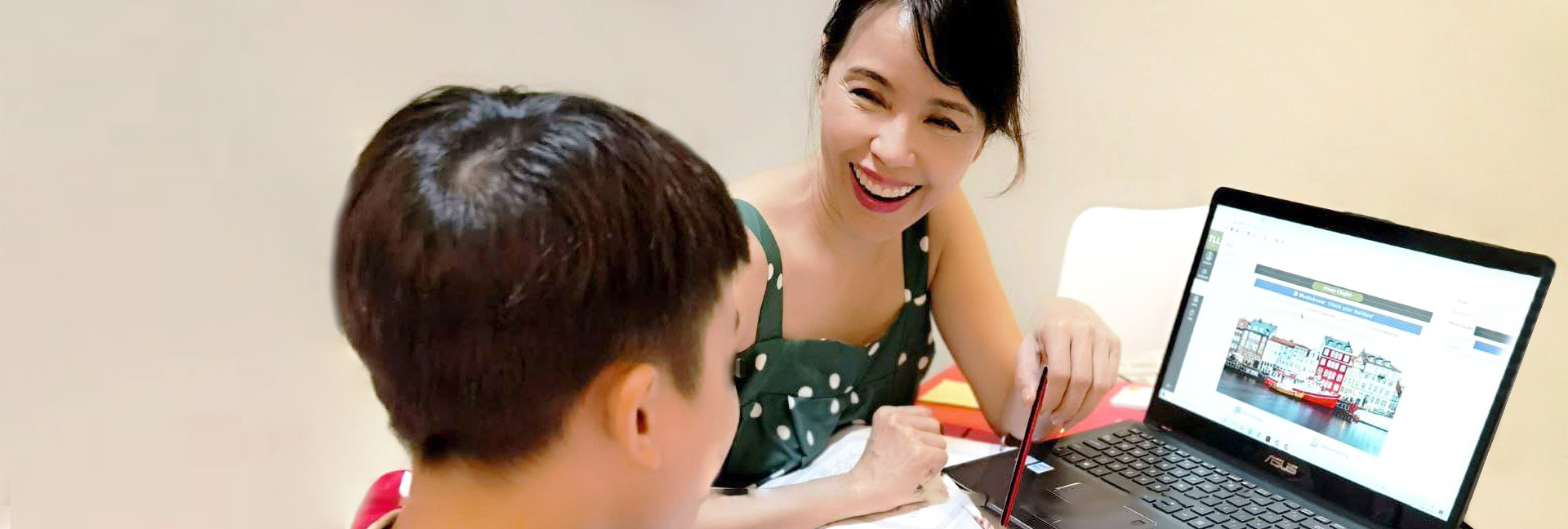
The leap from primary to secondary school is a pivotal moment in the Singaporean educational journey, often accompanied by a mix of excitement and anxiety. So what makes a successful transition from primary to secondary school? This is a question parents in Singapore grapple with all the time, and renowned Mediacorp actress and ‘Ah Jie’ Zoe Tay is no different.
She has graced our television screens in dozens of iconic roles across three decades, but the most important role Zoe has taken on may well be the one that viewers are not privy to — that of a doting mother to her three sons with her husband Philip Chionh.
However, balancing the demands of a busy acting career and being actively involved in her sons’ education is no easy task. In fact, the actress said that she has to plan her schedule carefully in order to focus on helping Brayden, 16, Ashton, 14, and Nathan, 11, prepare for their end-of-year examinations.
All three boys have been taking classes at The Learning Lab since 2017, and in that time both Brayden and Ashton have made the leap to secondary school. With Ashton nearing the end of Secondary 1, we thought this would be a good time to hear from Zoe on her experience with preparing her sons to make the transition to secondary school. Here is what she had to say:
1. Navigating a heavier workload

When Brayden was about to enter secondary school, I was quite stressed because I had no idea what to expect at the time. One of the biggest changes both Brayden and I had to get used to was the increase in workload.
Secondary school students have more subjects to deal with and also heavier CCA commitments. There was an adjustment period during the transition between grade levels when we had to work out with Brayden how to manage his time better and differently, so that he could cope.
The way students are taught and assessed is also different in secondary school compared to primary school. There is more group work and more presentations. As a parent I had to become familiar with all the changes so I could support Brayden more effectively.
I was glad to be able to receive some advice from Brayden’s TLL teachers on what to expect, which has also helped me when it came to Ashton’s turn (to start secondary school).
2. Letting Them Try New Things

We also believe in exposing the boys to new things that might not be directly related to schoolwork, because these give them new perspectives and teach them to think differently. This also helps take their mind off the transition and adjustment period by giving them a familiar activity to turn to.
All my sons have been taking piano lessons for some time, but as they get older and enter secondary school, I have also been encouraging them to explore more activities or topics that interest them.
At the same time, we want to ensure we are not stressing them out too much because there is already a lot to deal with in secondary school, so it’s good for them to be guided by their own interests when trying out new things.
3. Getting Them to Be More Independent

Making the transition to secondary school has also been a good time to get my boys to become more independent when it comes to taking responsibility for their schoolwork. As teenagers, they are already asking for more independence in other areas anyway!
For example, they can handle simple things like keeping track of their own schedule and helping with chores, such as feeding and walking the dogs.
COVID-19 has actually helped with this — I got to see them all the time at home, which helped me keep a closer eye not just on their schoolwork but also everything else they were doing.
I also ask them to start thinking about what they want to achieve in the future, and how they plan to get there. They are at the stage where they are beginning to have views on what they want or don’t want to do, and we want to encourage that.
4. Giving Them the Emotional and Psychological Support They Need

Entering secondary school can be a challenging transition for any child because so many things are different, and as a parent you want to be able to give them the emotional support they need to get through this tough time.
This year, I think being at home all the time because of COVID-19 really helped the bond between my sons and me grow stronger. They don’t have anywhere else to go!
While it can be exhausting as my boys are always jumping up and down and asking for my attention, staying at home has really allowed me to be there for them whenever they need me.
So, if there was anything that they were struggling with or needed to talk about, it was just easier for me to be on top of things. That’s important to my husband and me, because even though we want them to be more independent, we have to acknowledge the fact that they are, after all, still children dealing with a lot of changes.
5. Maintaining and Building on Good Habits

I always tell my boys that they must carry over the good habits that they picked up in primary school to secondary school.
The environment may be different, but I remind them to approach everything with the same attitude as in previous years.
For example, it’s still important for them to revise early for examinations and not leave everything to the last minute.
In fact, it is even more important to do so, because of the increased workload in secondary school. So they have to be able to apply these habits when they enter secondary school too. Making a successful transition to secondary school doesn’t just involve familiarising yourself with new classes, teachers, and schoolmates – it’s about adapting your mindset to new responsibilities too.
Get Ahead and Stay Ahead
As Zoe Tay demonstrates, making the transition to secondary school need not be an anxiety-laden and overly complicated affair for you and your child.
If your child is indeed struggling with the transition to secondary school, remember that it's a natural phase of their educational journey. Patience, open communication, and compassion are key to easing their worries. For now, here are some of TLL’s actionable tips for a smoother transition to Secondary 1 to help you show them your support:
- Create a supportive home environment: Establish a calm and organised space for study and relaxation. This differs from just providing emotional support, as it involves setting up a physical environment that promotes focus and reduces stress. If your child shares a bedroom with someone, see if you can provide a dedicated study area in your home or work out a schedule to allow them their own private study time. This will give them the time and space they need to process big changes in their lives, as well as to handle day-to-day tasks like homework.
- Practise good time management: Help your child develop a schedule that balances schoolwork, hobbies, and recreation. This could involve time management techniques like time-blocking or Pomodoro, or for kids who are overworking themselves way too often, creating opportunities for family time to enforce some much-needed rest.
- Keep avenues of communication open: Between secondary school and the incoming tidal wave of puberty hormones, the teen years can be rough. It’s important to maintain communication with your teen throughout this time and let them know you’re always here for a chat. Regular check-ins can help you understand your child's concerns and progress, making it easier to provide timely support and advice. They may not always respond to your gentle questions, but be assured that they appreciate knowing you’re there for them.
Here at The Learning Lab, we want to help make your child’s education journey as smooth as possible. From 5 things you may not know about Secondary 1 to common challenges for Secondary 1 students, we offer a rich library of resources that parents and caregivers can tap into.
Our Primary 6 enrichment programme and Secondary 1 tuition teachers are also always ready to offer advice, and we also have a robust and all-encompassing secondary school curriculum that will equip your child with the skills he or she needs to thrive while managing the transition.
